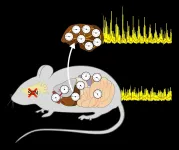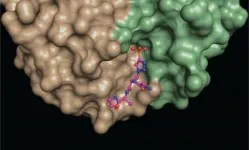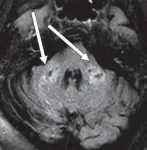(Press-News.org) The tuberculosis (TB) vaccine Bacillus Calmette-Guerin (BCG) could protect newborns against a variety of common infections, such as upper respiratory tract infections, chest infections and diarrhoea, according to a new study in The Lancet Infectious Diseases.
The research is the first of its kind to rigorously investigate the full range of illnesses BCG could protect infants against. It suggests that vaccinating all babies on the day of birth with BCG could reduce neonatal infections and death in areas with high infectious disease rates, potentially saving thousands of lives a year. The results also increase the possibility that the vaccine might be used to protect children and adults against COVID-19 and other new infectious diseases.
Led by the London School of Hygiene & Tropical Medicine (LSHTM) through the MRC/UVRI & LSHTM Uganda Research Unit, and funded by the Wellcome Trust, the study involved a randomized control trial of 560 newborns in Uganda, who were monitored for a range of illnesses.
After six weeks, infection rates from any disease were 25% lower in the group who received the vaccine at birth, compared to the group that had not yet received the vaccination. Particularly vulnerable groups such as low birth weight babies, and boys, seemed to be protected the most. Importantly, BCG appeared to protect against mild, moderate and severe types of infections.
Sarah Prentice, lead author from LSHTM, said: "Nearly a million babies die every year of common infections so we urgently need better ways to protect them. Our research suggests that ensuring that BCG is given at birth could make a big difference in low income countries, potentially saving many lives."
In the study, healthy Ugandan infants were randomly assigned to receive BCG at birth or at six weeks of age. The infants were followed-up by doctors, blinded to the intervention, for 10 weeks to look for episodes of any type of illness or infection.
The research team then compared how often infants in the two groups presented to doctors with infections of any kind, except TB, to see whether having BCG made a difference. They also took blood samples from both groups, to look at differences in their innate immune system, the body's first line of defence against infections.
Infants who had been vaccinated with BCG at birth presented to doctors with any kind of infection 25% less often than infants who had not. Protection from BCG didn't seem to be against one specific type of infection, but for all types, such as common colds, chest infections, and skin infections.
After the group receiving BCG at six weeks had been vaccinated, there was no difference in the rates of infection between the two groups - the delayed group's immunity 'caught-up' once they'd received BCG.
Hazel Dockrell, Professor of Immunology at LSHTM and one of the co-authors of the study, adds: "It's very exciting to think that BCG vaccination might help keep newborns safe against other dangerous infections, in addition to providing protection against TB. Although BCG is recommended at birth in many countries, it is often delayed due to logistical difficulties. Ensuring that the vaccine is given on day one, in areas with high rates of infectious disease, could have a major impact on infections and deaths in the newborn period."
The team can't definitively say why BCG offered this additional non-specific protection, but the research showed evidence of changes in the innate immune system of vaccinated infants, which may suggest that BCG boosts the immune system to work better against any infection.
This has led the researchers to suggest that it could provide protection in the early stages of novel outbreaks, such as COVID-19 or Ebola, before specific vaccines have been developed.
Further studies are already underway to explore whether BCG could play a role in the response to COVID-19, with large trials involving health care workers and the elderly. The Director General of WHO Dr Tedros Ghebreyesus has co-authored an article expressing interest in the possible use of BCG for protection against COVID-19.
Dr Prentice said "Since the findings show that BCG seems to offer wider protection against a range of infections, our study also raises hopes it might be useful in protecting the general population against COVID-19 and future pandemics - though we will need to see the results of other, more specific studies to know for sure."
The researchers also believe it is worth investigating whether reintroduction of BCG in countries where it is no longer in routine use, such as the UK, is beneficial, not for its effects against TB, but to protect vulnerable infants in neonatal units against other infections.
The authors acknowledge limitations of their study. As it was relatively small, it was not possible to show an effect of BCG on numbers of deaths from infections in the study participants. Also, because the study was only conducted in Uganda, it cannot be certain that these extra, beneficial effects of BCG would be seen in other settings. However, previous studies conducted in West Africa have shown a reduction in neonatal deaths following BCG at birth, to a similar extent as the reduction in infection rates seen in this study.
INFORMATION:
For more information or interviews, please contact press@lshtm.ac.uk.
A copy of the embargoed paper is available upon request.
Once published, the article will be available here: http://www.thelancet.com/journals/laninf/article/PIIS1473-3099(20)30653-8/fulltext
Notes to Editors
Publication
Sarah Prentice, Beatrice Nassanga, Emily L Webb, Florence Akello, Fred Kiwudhu, Hellen Akurut, Alison M Elliott, Rob J W Arts, Mihai G Netea, Hazel M Dockrell, Stephen Cose, for The Delayed BCG Study Team. BCG-induced non-specific effects on heterologous infectious disease in Ugandan neonates: an investigator-blind randomised controlled trial. The Lancet Infectious Diseases. DOI:10.1016/ S1473-3099(20)30653-8.
The London School of Hygiene & Tropical Medicine (LSHTM) is a world-leading centre for research, postgraduate studies and continuing education in public and global health. LSHTM has a strong international presence with over 3,000 staff and 4,000 students working in the UK and countries around the world, and an annual research income of £180 million.
LSHTM is one of the highest-rated research institutions in the UK, is partnered with two MRC University Units in The Gambia and Uganda, and was named University of the Year in the Times Higher Education Awards 2016. Our mission is to improve health and health equity in the UK and worldwide; working in partnership to achieve excellence in public and global health research, education and translation of knowledge into policy and practice.
http://www.lshtm.ac.uk
Circadian clocks, which regulate the metabolic functions of all living beings over a period of about 24 hours, are one of the most fundamental biological mechanisms. In humans, their disruption is the cause of many metabolic diseases such as diabetes or serious liver diseases. Although scientists have been studying this mechanism for many years, little is known about how it works. Thanks to an observation tool based on bioluminescence, a research team from the University of Geneva (UNIGE) were able to demonstrate that cells that compose a particular organ can be in-phase, even in the absence of the central brain clock or of ...
LA JOLLA--(February 17, 2021) In structural biology, some molecules are so unusual they can only be captured with a unique set of tools. That's precisely how a multi-institutional research team led by Salk scientists defined how antibodies can recognize a compound called phosphohistidine--a highly unstable molecule that has been found to play a central role in some forms of cancer, such as liver and breast cancer and neuroblastoma.
These insights not only set up the researchers for more advanced studies on phosphohistidine and its potential role in cancer, but will also enable scientists ...
Deprive a mountain range of its wolves, and soon the burgeoning deer population will strip its slopes bare. "I now suspect that just as a deer herd lives in mortal fear of its wolves, so does a mountain live in mortal fear of its deer," wrote ecologist Aldo Leopold in his landmark 1949 title "A Sand County Almanac."
Leopold proposed that predators keep herbivore populations in check to the benefit of an ecosystem's plant life. Remove one link in the food chain, and the effects cascade down its length. The idea of a trophic cascade has since become a mainstay in conservation ecology, with sea urchins as a prime example just off the California ...
Rapid global urbanization has dramatically changed the face of our planet, polluting our atmosphere with greenhouse gases and causing global warming. It is the need of the hour to control our activities and find more sustainable alternatives to preserve what remains of our planet for the generations to come.
Carbon dioxide (CO2) and carbon monoxide (CO) make up a large proportion of industrial flue gases. Recent research has shown that certain microorganisms are capable of metabolizing these gases into useful by-products. Thus, attempts are now being directed to ...
BOSTON - Delirium, a common syndrome among older adults, particularly in those who have recently undergone surgery, critically ill patients in the ICU, and in older patients with multiple health issues, is a form of acute confusion that is characterized by poor attention, disorientation, impaired memory, delusions, and abrupt changes in mood and behavior. Moreover, patients who experience delirium are at increased risk of long term cognitive decline. Recently, clinicians and scientists have recognized that delirium is one of the first signs of COVID-19 infection in older patients and that it occurs frequently in patients with severe COVID-19 disease.
In a new study led by an interdisciplinary team of gerontologists, geriatricians, precision medicine ...
Dogs are generally considered the first domesticated animal, while its ancestor is generally considered to be the wolf, but where the Australian dingo fits into this framework is still debated, according to a retired Penn State anthropologist.
"Indigenous Australians understood that there was something different about the dingoes and the colonial dogs," said Pat Shipman, retired adjunct professor of anthropology, Penn State. "They really are, I think, different animals. They react differently to humans. A lot of genetic and behavioral work has been done with wolves, dogs and dingoes. Dingoes come out somewhere ...
Scientists from the Skoltech Center for Computational and Data-Intensive Science and Engineering (CDISE) and the Skoltech Digital Agriculture Laboratory and their collaborators from the German Aerospace Center (DLR) have developed an artificial intelligence (AI) system that enables processing images from autonomous greenhouses, monitoring plant growth and automating the cultivation process. Their research was published in the journal IEEE Sensors.
Modern technology has long become a fixture in all spheres of human life on Earth. Reaching out to other planets is a new challenge for humankind. Since greenhouses are likely to be the only source ...
BOSTON - Use of a cosmetic laser invented at Massachusetts General Hospital (MGH) may improve the effectiveness of certain anti-tumor therapies and extend their use to more diverse forms of cancer. The strategy was tested and validated in mice, as described in a study published in Science Translational Medicine.
Immune checkpoint inhibitors are important medications that boost the immune system's response against various cancers, but only certain patients seem to benefit from the drugs. The cancer cells of these patients often have multiple mutations that can be recognized as foreign by the immune system, thereby inducing an inflammatory response.
In an attempt to expand the benefits of immune checkpoint inhibitors ...
Leesburg, VA, February 17, 2021--According to an open-access article in ARRS' American Journal of Roentgenology (AJR), COVID-19-related disseminated leukoencephalopathy (CRDL) represents an important--albeit uncommon--differential consideration in patients with neurologic manifestations of coronavirus disease (COVID-19).
"Increasingly," wrote Colbey W. Freeman and colleagues from the University of Pennsylvania, "effects of COVID-19 on the brain are being reported, including acute necrotizing encephalopathy, infarcts, microhemorrhage, acute disseminated encephalomyelitis, and leukoencephalopathy."
Among the 2,820 patients with COVID-19 admitted to the authors' institution between ...
When materials reach extremely small size scales, strange things begin to happen. One of those phenomena is the formation of mesocrystals.
Despite being composed of separate individual crystals, mesocrystals come together to form a larger, fused structure that behaves as a pure, single crystal. However, these processes happen at scales far too small for the human eye to see and their creation is extremely challenging to observe.
Because of these challenges, scientists had not been able to confirm exactly how mesocrystals form.
Now new research by a Pacific ...






